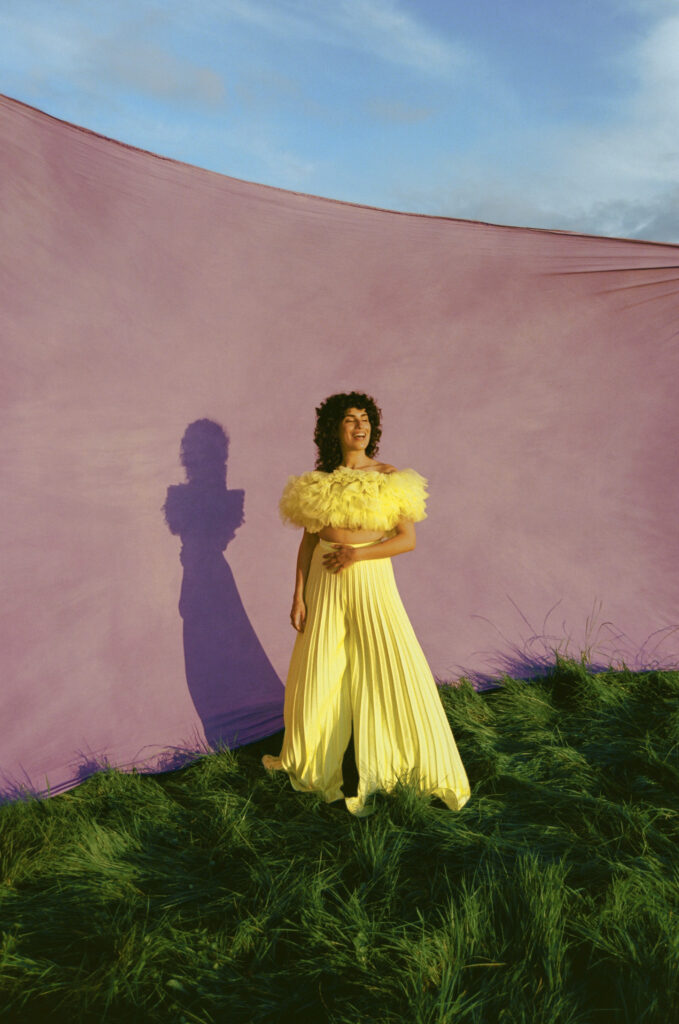It wasn’t long ago that Polish singer/songwriter Sonia Stein slipped into our musical sphere like a dream with the release of her single ‘Blooming Season‘. Described by us as a “wonderfully elegant track…incredibly lush and vibrant,” you can imagine our excitement when Sonia unleashed her ‘Blooming Season Part 1’ EP earlier this month.
Deciding it was time to get to know the artist better, we were grateful that Sonia took time out of her busy schedule to chat with us. Speaking about her year at Berklee College of Music, what she learned about herself while crafting her latest EP, and how she goes about turning an idea into a piece of music, please give a warm welcome to our friend Sonia Stein!
Welcome aboard Sonia! I’m super excited to re-introduce you to our ever-expanding audience! Before we get into the nitty-gritty, could you tell us about your musical journey? I know you released your debut EP back in 2014.
Hi! Thanks for having me! I guess my musical journey started when I started becoming aware of my voice and my affinity for singing when I was really young – but I really started exploring my creativity within that at around 15 when I started sitting at the piano and using what I could remember of my childhood piano lessons to start writing songs.
From then on, I spent every school break in the music room writing songs and spent a couple of summers at music programmes after which I applied to Berklee College of Music in Boston. I spent a year there before I realised that I was learning more about the craft outside of classes collaborating in studios so that’s what I have been doing ever since then.
Now, you released a tune in 2020 called ‘Philosophical’ which has seen significant exposure. Over 1,6 million Spotify plays to be precise. How on earth does it feel to know that so many people have listened to and resonated with one of your songs?
Honestly, it feels surreal and I mean that quite literally. Those kinds of numbers don’t really make sense in my head so it just feels completely separate from me and something hard to connect to if that makes sense. It does make me happy that that song somehow resonates because I did feel like it was a bit of a niche subject to write a song about. It was also written so quickly and it was my first collaboration with Robin Pearkes who ended up making so much music with me after that so it’s a cool song to look back on.
We’ve fallen completely in love with your brand new EP ‘Blooming Season Part 1’ here at Mesmerized. What’s one thing you learned about yourself as an artist while creating the EP?
I think I came into writing this project really wanting to create something different from before. I always admired artists who had a creative vision beyond singular songs and I really wanted to push myself to do that.
I always took pride in not being too precious about my releases because I know what perfectionism can do to an artist and I never wanted to get stuck in a loop of creating art that never saw the light of day. But I felt that I had been creating in the same way for so long and I wanted to experiment with being more intentional about creating something that feels cohesive sonically, emotionally and visually and less like a stream of consciousness.
So I think what I learned is just that I can create in different ways. That creativity can still lead the way even if there is a bit more structure around it.
Who would you put down as some of your biggest musical influences and who would you ultimately credit for helping shape and form your overall sound?
This is always the hardest question I get asked. I would say when I was younger I listened to albums like ‘Stripped’ by Christina Aguilera, ‘Let Go’ by Avril Lavigne, ‘Missundaztood’ by P!nk, and ‘Confessions’ by Usher. I think a lot of this music seeped into my subconscious before I even knew it.
Then when I started to write my own songs on the piano, I was really inspired by other songwriters who I saw do the same. I remember being really inspired when I discovered A Fine Frenzy (Alison Sudol) and their album ‘One Cell In The Sea’. It really permitted me to imagine myself having a music career – because I always knew I didn’t feel like the pop girls I watched on MTV.
Then I discovered Regina Spektor and listened to her exclusively for a few years. My sound now is really inspired by a mishmash of saved things on my Spotify. I’m usually drawn to a songwriting and delivery style and pay attention to production later.

Please tell us a bit about your songwriting process. Not specifically for any song but just in general. How do you take an idea and turn it into a piece of music?
I usually have a few ideas of what I want to write songs about floating around in my head. When I get into the studio with whoever I am working with that day and we start playing each other references of things we like, one kind of jumps out at me as the idea that wants to get written about that day or over a specific loop/sound.
Then I kind of dive into melody and lyrics for a while, while the producer has a play with production. I like writing lyrics mostly on my own as I feel that it’s a super personal process and I really want it to sound and feel like something I would say in real life.
Then, even though this was all happening in the same room at the same time, we would kind of show each other what we have made and fine-tune each other’s parts to make it feel good. That’s been the process these days as a lot of the songs have been written in the studio.
What are your thoughts regarding the music industry of today? And, if you could, what changes would you make to it?
It’s a pretty complicated question. I think it’s great and empowering that artists have so much control over their art and music and can build up their audiences on social media platforms. I also think that means artists have to not only be great at making music but also hone about 15 other skills and have 20 times the drive to “make it” to see any “success.”
I think streaming platforms have made the average listener feel entitled to constant new material that comes basically for free which puts a lot of pressure on artists to constantly create and to be chronically online. I’m not really sure how things could be changed with technology evolving so fast but I do think that with the rise of AI and the ease at which “art” can be generated, there might be a newfound appreciation for things that take time and are made with care. That’s at least my hope.
OK, Sonia – desert island time! You’re allowed to grab 3 albums before being stranded on an island. Which do you choose?
Oooo I think I’d have to go with ‘Stripped’ by Xtina, The Rise and Fall of a Midwest Princess by Chappell Roan, and ‘Rose in the Dark’ by Cleo Sol.
Thanks so much for taking the time to chat with us Sonia! It’s been great getting to know you better! Before we let you go though, what comes next for you musically, and do you have any words of wisdom you’d like to leave us with?
Thank you for all your questions!! Next for me is ‘Blooming Season Part II’ which I have been working on recently and I’m very excited about. I guess words of wisdom would be just to trust that wherever you are is part of wherever you’re going. The only way through is through!



